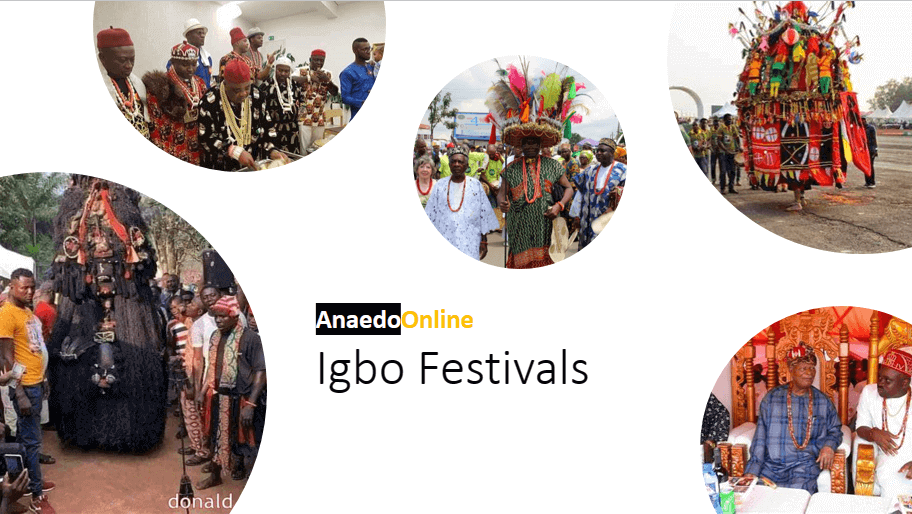Festivals in Igboland: The Igbo people of Nigeria are renowned for their rich cultural heritage, which is deeply ingrained in their traditional beliefs and customs. One of the most notable aspects of Igbo culture is the vibrant array of festivals they celebrate throughout the year. These festivals serve as significant cultural events that bring communities together, honor ancestral traditions, the seasons, and agricultural products, and showcase the diversity and artistic expression of the Igbo people.
One of the most prominent festivals celebrated by the Igbo is the New Yam Festival, known by various names such as Iwa ji, Iri ji, or Ike ji depending on the Igbo dialect. This festival takes place during early August, marking the end of the rainy season and symbolizing the culmination of the harvest while signifying the start of a new work cycle. During this festive occasion, old yams from the previous year’s crop are either consumed or discarded on the eve of the New Yam Festival, and the following day is dedicated to feasting on yam-based dishes, showcasing the abundance of the produce.
Aside from the New Yam Festival, the Igbo people celebrate several other notable festivals across different regions of Igboland. These include the Ofala Festival, which is very prominent in Onitsha, Anambra state, the Ovala Festival in Agulueri, Anambra state, the Aju Festival in Ugbo, Awgu LGA, Enugu state, the Iwa Akwa Festival in Obowo, Imo State, the Igu Aro Festival in Enugu-ukwu Anambra, the Ekpe Festival in Umuahia Abia State, and a host of other Igbo festivals. Each of these festivals has its unique significance and showcases various aspects of Igbo culture through contemporary shows, masquerade dances, fashion parades, and other cultural activities.
The diverse and vibrant Igbo festivals offer a captivating glimpse into the traditions, values, and artistic expressions of the Igbo people. These celebrations not only foster a strong sense of community but also serve to preserve and pass down the rich cultural heritage of the Igbo from one generation to another.
below is a list of all the popular traditional festivals celebrated by the Igbos.
-
Ofala Festival: A Majestic Celebration of Igbo Heritage
The age-long Ofala festival is a majestic celebration deeply rooted in Igbo traditions particularly the Anambarians. Spanning across towns like Onitsha, Umueri, Umuoji, Aguleri, Nnewi, and Ukpo, this vibrant festival is a testament to the cultural richness of the Igbo people. In some towns, Ofala is celebrated every year, starting from the coronation of the Obi until his death. The last Ofala is held after the death of the Obi. However, in other towns, Ofala is celebrated every two to three years.
Origins and Significance:
Derived from “Ofo” (establishing authority) and “Ala” (land), Ofala is a yearly renewal ritual led by the king, Igwe, or Obi—the traditional monarch of the community. Its roots trace back to the Benin kingdom, celebrated as the Igue Festival, and shares similarities with the New Yam Festival. Although unique to towns in Anambra state, Ofala is considered the second most prominent festival in Igboland, after the New Yam festival.
Distinct Ofala Ceremony:
The Ofala ceremony is a profound spiritual journey for the monarch, involving a week-long retreat called “Inye Ukwu na Nlo.” This period is dedicated to prayers, gratitude to the gods, sacrifices, and spiritual cleansing. The culmination is marked by a spiritual walk, blessing the community for the coming year.
Ceremonial Highlights:
In Nnewi, the Ofala festival signifies the time when the king appears officially to his subject in his royal regalia, opening up his palace for all. While the subjects, in turn, pay homage to him. This is also the time for any royal announcement to be passed.
The festival spans two to three days, commencing with the monarch’s grand procession, adorned in regal attire. The first day includes title conferment ceremonies, recognizing eligible men with titles and awards. The second day sees the monarch receiving felicitations, with deities, masquerades, and totems paying homage.
Community Involvement and Contributions:
Titled chiefs, government officials, industry leaders, and the public pay homage, contributing gifts and congratulations. The King invokes blessings on the community, praying for wealth, prosperity, good health, and peace. The occasion also serves as a fundraising platform for community projects.
Ofala’s Legacy and Anticipation:
Communities hold Ofala annually or every few years, with a special “last Ofala” symbolizing the enthronement of a new king after the monarch’s passing. Indigenes eagerly anticipate Ofala, a time to express gratitude for a bountiful harvest, celebrate life, and revel in the joyous festivities that define this iconic Igbo tradition.
-
Iri Iji Ohu (New yam festival)
The New Yam Festival holds a revered position among all festivals in Igboland, earning its title as the “king of all festivals” for two significant reasons. Firstly, it is a ceremony that unifies all Igbo communities, transcending local boundaries and bringing people together in celebration. Secondly, it pays homage to the king of all plants, the Yam, which holds great importance in Igbo culture.
The New Yam Festival not only marks the culmination of the harvesting cycle but also welcomes the advent of the next planting season. It serves as a collective expression of gratitude for the bountiful harvest, and an opportunity for the community to come together and celebrate their agricultural heritage. By honoring the Yam as the king of all plants, they acknowledge its vital role in sustaining their livelihoods and nourishing the community.
Thus, the New Yam Festival encapsulates the essence of Igbo culture, uniting diverse communities under the common thread of agricultural abundance and communal celebration.
The Festival’s Origin:
Stepping into the rich history of Igbo tradition, we immerse ourselves in the heartwarming celebration of the New Yam Festival. Known by various names such as Iri Ji, Onwa Asaa, or Iwa Ji, this festival stands as a resilient symbol of cultural identity amidst the ever-changing currents of modernity. While the New Yam festival is observed throughout all Igbo communities, each community adds its unique touch, thereby enriching the overall experience.
In some Igbo communities, it is considered taboo to consume yam before the festival. In others, it signifies thanking the gods and ancestors for a bountiful harvest, known as “Onwa Asaa.” Originating from Arochukwu, the festival spread its influence across Igbo communities, showcasing the diversity of celebrations.
The New Yam Festival‘s genesis is shrouded in myths and legends, with one popular story revolving around the sacrifice of Eze Nri’s children—Ahiajoku and Ada. This poignant tale speaks of a severe famine that ultimately led to the reverence of yam as a life-saving deity.
Symbolism and Essence:
Rooted in the agrarian nature of the Igbo people, the New Yam festival symbolizes the significance of yam in their socio-cultural life. Despite evolving over the years, the enthusiasm and meticulous preparations for the event remain unwavering. Celebrated across Igbo communities, it marks the completion of the harvest season and the beginning of a new year.
Pre-Festival Rituals:
The New Yam festival‘s announcement is followed by a cleansing period, a sacred time to purify the land and its people. Spiritual body cleansing, symbolized by rituals like “ịmáchà àhụ̀ irì jí mmírí”, involves bathing children with plants, and preparing them for the new year. Old yams are consumed or discarded on the eve of the festival, making way for fresh harvests.
Day of Celebration:
The festival day bursts with color, rituals, and recreational activities, with some involving a host of masquerades. After the customary breaking of the Kolanut, the Igwe or chief priest takes the first bite of roasted yam, offering thanks to God or the gods, as it was in the past for a successful harvest. Each household presents yams for prayers, with the head cutting token parts for Ahiajoku and the deity Ani (Earth) who is believed to be in charge of fruitfulness. The sanctified yams are then cooked with palm oil. Despite widespread Christianity in Igbo land, this is one Igbo tradition that hasn’t lost its essence.
3. Ikeji Festival: A Vibrant Celebration of Abundance and Tradition
The biggest and most prominent festival in Abia and Imo state is the Ikeji festival. The Ikeji festival holds a vanguard position among the notable cultural events in Abia and Imo states. It signifies the transition from the planting season to the bountiful harvest period. Occurring annually in either March or April, this four-day event often coincides with Easter festivities, adding to the region’s vibrant celebrations.
The festival is a time for expressing gratitude, extending felicitations, and seeking blessings for abundant harvests through propitiations. Each of the four days of the Ikeji festival carries its distinctive activities, reflecting the rich traditions of the Igbo people, whose calendar divides a week into four days.
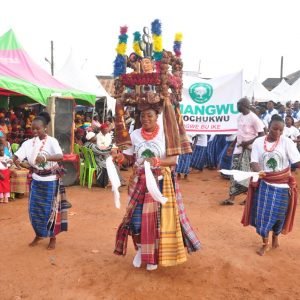
The first day, known as Eke, sets the tone as the best farm produce and livestock are brought to the bustling Eke market. Here, they are offered at affordable prices, contributing to a lively atmosphere that fosters trade and community connections. On the second day, called Orie, the slaughtering of livestock takes place, accompanied by sumptuous feasting, further enhancing the spirit of togetherness.
Afor, the third day, continues the festivities with ongoing feasting and captivating performances by various dance groups and smaller masquerades. As the grand finale approaches on the fourth day, Nkwo, the Ikeji festival reaches its crescendo. This day witnesses an awe-inspiring extravaganza featuring the majestic “Nnukwu Nmanwu” masquerade. Adorned in regal attire, this iconic masquerade captivates the crowd with its dignified movements, synchronized to the enchanting sounds of Nkwa Egwu music.
Undoubtedly, one of the highlights of the Ikeji festival is the highly anticipated ITO-EBULE competition. During this riveting event, a ram is tied with a delicate thread infused with protective charms by the host chief priest. Native doctors and masquerades from different regions gather to test their skills and unravel the intricate knot. The victor, who successfully unties the thread, earns the privilege of taking the ram home. This captivating spectacle never fails to enthrall spectators, with the Ajofia masquerade from Nnewi gaining a reputation for consistent victories whenever it participates in the festival held in Imo state.
4. Iwa Akwa
Iwa Akwa holds immense cultural importance in Imo State, specifically in the areas of Ehime Mbano, Ihitte Uboma, Obowo, and Ahiazu Mbaise. Iwa Akwa is a ceremonial event marking the transition from boyhood to manhood, serving as a rite of passage for young boys. To signify their newfound status as men, boys undergo a series of tests and, upon successful completion, are initiated into the age-grades. Following this initiation, a celebratory reception takes place, featuring the laying out of a valuable wrapper (George) and a spiritual leader offering blessings.
During Iwa Akwa, participants, who are typically of the same age grade, undergo a symbolic crossing into maturity. The wearing of cloth (Iwa Akwa) serves as a figurative representation, representing the transition from a state of nakedness to one of being covered and protected. Through this act, it is believed that the initiates have shed their former vulnerable state and embraced their newfound manhood.
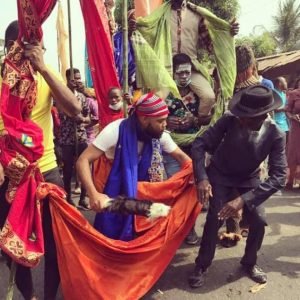
The person entrusted with “Iwa Akwa” acts as a senior friend, cousin, colleague, and confidant to the initiate. Their presence and support during this ceremony highlight the deep bond between them.
Typically lasting for two days, the preparations and merriments for Iwa Akwa often start a day before the main event due to traditional reasons.
Witnessing the Iwa Akwa ceremony offers an opportunity to delve into the rich cultural history of Igboland and Imo State. With its deep-rooted customs and cherished traditions, this initiation into manhood symbolizes the commencement of a new phase in life, evoking a sense of pride, honor, and celebration.
5. Ezumezu
The Ezumezu Festival is a revered traditional festival celebrated by the Igbo people. This festival holds significant importance among the Igbere community residing in Bende Local Government Area of Abia State. It holds deep cultural meaning, serving as a rite of passage for the Igbo people and marking the transition between age grades within the community.
The festival comprises two ceremonies: Igbotomma, which signifies the end of an age grade, and Izarafa, which marks the beginning of a new age grade. Igbotomma translates to drop the cutlass. The cutlass symbolizes all the social responsibility and obligation expected from the indigenes. Igbotomma is an official exemption and retirement from all those responsibilities. Izarafa translated to Outing/Naming of a New Age Grade, on the other hand, is the acceptance of a certain age grade into the fold of official responsibility.
During the pre-colonial era, the age grade system was used as a means of governance and communication within the community. Individuals within the same age bracket were grouped into associations, known as age grades (Otu Ogbo). These Otu Ogbo’s played a vital role in decision-making and ratifying the king’s decisions. They also carried out important community activities such as tax collection, defense, and social work.
At the end of each year, the oldest age grade, typically in their 60s, retires from active duty. This retirement was symbolized by the age-grade members carrying hoes and cutlasses and dropping them on the festival day, known as Igbotomma. On the same day, a new age grade of youths in their late 20s and early 30s, known as Izarafa, would be inaugurated.
Today, the Ezumezu Festival takes place every three years, spanning three days of celebration. The first two days involve general gatherings at a central location. On the third day, the Igbotomma ceremony is conducted, with each age grade retiring and a new one being inaugurated. The retiring age grade members celebrate with feasts in their respective compounds, joined by friends and family who honorably commemorate their retirement.
7. Igu Aro festival
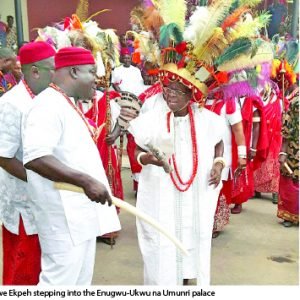
Igu Aro, translating to ‘counting years,’ holds significant meaning for farmers, marking the commencement of the new planting season during this traditional festival. The Igu Aro festival is a customary celebration, specifically practiced by the Igbo community in Enugwu-ukwu, Anambra State. This vibrant festival takes place in February, signaling the start of a new year and the planting season. It attracts a large number of people and organizations to Enugwu-ukwu annually, greatly promoting tourism and benefiting various sectors such as hospitality, transportation, businesses, and heritage sites.
During the Igu Aro festival, the community engages in a range of traditional and cultural events, including the Umunri colloquium. These festivities are celebrated with enthusiasm and joy, reflecting the rich heritage and customs of the Igbo people. The festival holds immense economic importance for the community, as it is believed to bring blessings or curses from the gods for the upcoming year.
A significant aspect of the festival is the oracular utterances of the priest, who provides prophecies and predictions about the harvest season. This includes insights into whether there will be abundance or famine (ugani), peace (udo) or problems (nsogbu), war (agha), or death (onwu). The community places great value on these predictions, with positive prophecies inspiring them to work diligently during the planting season to reap the rewards of their hard labor. In contrast, negative prophecies serve as a cautionary reminder, prompting the community to proceed with care during the new season.
The Igu Aro festival is renowned for its vibrant colors, cultural significance, and focus on agriculture. As part of the festivities, prayers are offered for a bountiful harvest and a successful farming season. Through this celebration, the Igbo people express their deep reverence for their cultural traditions and their reliance on the blessings of the gods for agricultural prosperity.
8. Imo-Oka
This is a very eventful festival prominent amongst the Awka people of Anambra state. This spirited celebration unfolds over two weeks, a dedicated homage to a revered female deity believed to bestow fertility upon the land, ensuring bountiful harvests for the community.
Commencing with a lively procession of Awka people to Umuokpu, the festival unveils a dazzling array of masquerades and captivating dances. The climax of the festivities occurs on the final day with a pilgrimage to the Imo-Oka stream, accompanied by the rhythmic cadence of rain that graciously falls in the late afternoon, adding a divine touch to the culmination.
Imo Oka is heralded by four significant events, each a testament to the deep-rooted traditions of the Awka people. The ede-mmuo, ogwu oghugha, egwu Opu-Eke, and Egwu Imo-Oka collectively contribute to the festival’s grandeur, weaving together elements of spirituality and cultural expression.
A captivating highlight is the Egwu Opu Eke, a cultural dance performed by female worshipers adorned in vibrant costumes, both priestesses and ordinary women alike. This dance unfolds in the market square, a rhythmic tribute to the deity presiding over the Imo-Oka shrine.
The festival also introduces an array of masquerades (mmanwu), ranging from enigmatic figures delivering playful performances to others exuding an air of solemnity, even administering good-natured flogs to spectators. Each masquerade is a symbolic representation of Awka’s ancestors, believed to have journeyed from the realm of the departed to partake in the festivities.
Reflecting on my time at Nnamdi Azikiwe University in Awka, memories of the Imo-Oka festival resonate with a mix of awe and fear. The unexpected initiation of the festival brought forth amusing tales, from a friend unwittingly stepping out of his hostel only to be flogged back inside, to passengers in a commuter bus adeptly avoiding the seats adjacent to the exit door, ensuring a shield against the lashes meted out during the spirited Imo-Oka festival. The Imo-Oka festival, with its blend of tradition, fear, and laughter, encapsulates the dynamic spirit of the Igbo people’s cultural heritage.
9. Oke Aku Festival
The Oke-aku Ezza Ezekuna festival is a cherished traditional celebration observed by the Ezza Ezekuna people in Ebonyi State, Nigeria. Held in February, the festival commemorates the start of a new year and the beginning of the planting season. The Ezza Ezekuna people, known for their warm hospitality and cultural heritage, are descendants of Eze-kuna, the first son of Ekumenyi.
This festival holds great significance for the community, as agriculture plays a vital role in their lives, with yam regarded as the king of all crops. The festivities commence on New Year’s Day and extend throughout the first week of the traditional calendar year. The jubilant event begins on Orie day, with traditional greetings, well-wishes, and prayers for a prosperous and joyous year.
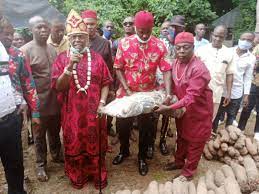
During the festival, each family head receives gifts from their spouse, adult children, and other relatives, symbolizing love and unity. The family head reciprocates by praying for the well-being of their loved ones and blessing kola nuts, which are shared among the community along with a special pepper paste called “uza ukpara.” As part of the ceremonies, remnants of old yams and palm kernels known as “nsa aku” are distributed among family members, friends, and relations. This act symbolizes the transition from a period of scarcity (unwu) when rationed old yams, palm kernels, and local snacks called “echa” were consumed, to a season of abundance marked by the harvest of new yams and other crops.
The Oke-aku Ezza Ezekuna festival not only celebrates the agricultural heritage of the Ezza Ezekuna people but also fosters unity, gratitude, and hope for a bountiful year ahead.
10. Igwa Nshi Festival: Celebrating Heritage
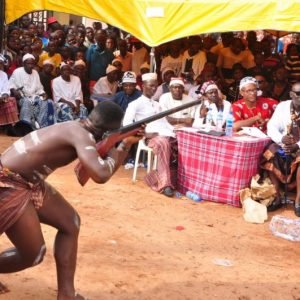
The Igwa Nshi festival is a cherished traditional celebration observed by the tight-knit community of Eke in Udi Local Government Area, Enugu State, Nigeria. Taking place annually in February, this eight-day festival holds drums at its core, turning Amankwo Square into a vibrant hub where people from the five villages comprising the community gather with drums of all sizes.
This festivity is more than just a musical spectacle; it’s a commemoration of the community’s historical triumphs in past wars. Eke, Udi holds this festival close to its heart, drawing indigenes from far and wide to converge at the village square. The air is filled with the beats of African drums, accompanying war dance theatrics, and staged mock battles that pay homage to their heroes of the past.
The Igwa Nshi festival not only serves as a cultural touchstone but also acts as a powerful magnet, pulling together families and friends who return to their roots to partake in the spirited celebrations. As the community unites in rhythm and remembrance, the festival becomes a living tribute to the enduring legacy of Eke, Udi, and its resilient people.
Be At Alert Ndigbo, There Is A Grand Plan To Wipe Us Out – Mbazulike Reveals
11. Okosa fishing festival
Okosa Fishing Festival is an annual event that takes place in February in a lake called OKOSA in Ebonyi State. This lake is home to different forms of fish ranging from Tilapia, catfish, starfish, prawns, crabs, etc. These fishes are allowed to grow and reproduce from the end of the festival to the beginning of another the following year. During this festival, great fishermen from the community compete with each other in all-day and night fishing thereby making available excess fresh fish for people at a small rate. This festival lasts for 1-2 months.
In Igboland, traditional festivals abound from community to community and the list is inexhaustible.
Here are scores of other festivals across Igboland:
- Nwafor festival in Ogidi
- Onwa Asato festival in Nri
- Omaliko festival in Abatete
- Udo festival in Igbo-Ukwu
- Ezi-okpaligwe festival in Amawbia
- Orima festival in Amorka.
- Aghalieaku Cultural Festival, Ozubulu.
- Ekpe Festival – Umuahia Abia State
- Egbo Festival – Ikwueke Oboro, Ikwuano, Abia State
- Inne Festival – Asaba, Delta State
- Odo Festival – Ngwo, Udi Enugu State
- Ede festival – Abagana, anambra state
- Odo Festival – Aku, Nsukka, Enugu State
- Uzoiyi Festival – Umuoji, Anambra State
- Ili Ede festival – Eziowelle, Umudioka, Umunnachi, Anambra State
- Ibono festival – Akama oghe, Ezeagu, Enugu State
- Owu festival – Isu and Abajah, Imo State
- Nwafo ogidi Festival – Ogidi Anambra State
- Igba owu festival – umuokanne ohaji, Imo state
- Iri unani festivals – umuokanne ohaji, Imo state
- Okorosha festival – Ifakala, Mbieri, Ubomiri,Imo state
- Okonko festival – umuowa, Amakohia, IMO state
- Ebuebu Amorji festival – Oduma Enugu state, Orlu Imo State
- Ihe Udummiri festival – Umuapu, Mgbirichi, Umuokann, Imo State
- Onwu Awaka Festival – Awaka, Imo State
- Igaji Egbema (new yam festival) – Egbema, Imo State
- Igaji (new yam festival) – Obosima, Imo State
- Igaji festival – Obogwe, Imo State
- Mkpukpuzo and Ita Okazi Festival – Emii, Imo State
- Igaji (new yam festival) -Amafor, Imo State
- Oji Ezinihitte festival – Ezinihitte, Imo State
- Mbom -Uzo festival – Ngo Okpala, Imo State
- Oruru- Ukwu festival – Enyiogugu, Imo State
- Bia were Oji and Riforo festival – Uvuru and Lorji, Imo State
- Itu Aka festival – Nguru Uboma Awaise, Imo State
- Igba Mmanwu/Isuachara festivals – Iho, Imo State
- Igaji festival -Ohuobaa, Imo State
- Omereife festival – Mgbele, Nkwesi, Nneukwu, Osu Obodo Eziorsu, Oguta Egbuoma and Egwe, Imo State
- Okorosha festival – Agwa, Awa Izombe, Akabo and Ejemekuru, Imo State
- Onwu Oru Festival – Uratta, Imo State
- Ugu-Uzo Festival – Emekuku Imo State
- Oke Aku Festival – Ezaa Ezekuna, Ebonyi State
- Inne Festival – Issele Uku, Delta State
- Ojiji Festival – Abakaliki, Ebonyi State
- Ogba Festival – Egede, Udi Enugu State
- Ezi ugbo festival – Asaba, Delta State
- Igba owu Festival – Orodo, Mbieri, Imo State
- Onwa Asato Festival – Awkuzu
- mmanwu Festival – Ituku, Enugu State
- Ite Festival – Isiopko, River State
- Omasuru Festival – Ahai, Ogbakiri River State
- Omabe Festival – Obimo, Enugu State
- Omabe Festival – Opi, Enugu Ezike, Nssuka, Enugu State
- Akatakpo Masquerade Festival – Ovoko, Enugu State
- Onunu Festival – Okpuje, Enugu State
- Oja Cultural Festival – Enugu State
- Etofia Akaeze hunting festival
- Ukpo and Olo Festivals (initiation for men and women in Edda)
- Ndagha Festival Asaga Owutu Edda (rite of passage into womanhood)
- Okpuru Uke Fishing Festival (there are ponds called okpuru that nobody is allowed to enter until a particular time of the year to harvest fish and in some fish are not harvested
- Ogaga Agwuagwu — Achi, Oji River LGA, Enugu State e.t.c
Post Disclaimer
The opinions, beliefs and viewpoints expressed by the author and forum participants on this website do not necessarily reflect the opinions, beliefs and viewpoints of Anaedo Online or official policies of the Anaedo Online.

